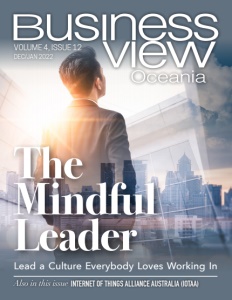The Mindful Leader
Lead a Culture Everybody Loves Working In
Business View Oceania interviews Michael Bunting, Founder and CEO of The Mindful Leader, for our focus on Professional Services.
The Mindful Leader is a globally renowned leadership organisation specialising in the field of transformational leadership development and culture change. The team is a collective of trainers and consultants from around the world, each contributing their own proven expertise and extensive experience in leadership development, mindfulness, team psychological safety, and cultural change. Together, they share a common vision of empowering leaders to build values-aligned, growth based, psychologically safe workplace cultures that people genuinely want to work in.
Prominent leadership expert and author Michael Bunting has over 20 years of experience teaching mindful leadership practices to thousands of leaders, from CEOs to front-line managers. He begins: “We recognise that leaders have an immense influence on the shaping of organisational cultures, and that those cultures in turn shape societies around the globe. Our work at The Mindful Leader expands upon the internationally acclaimed Kouzes and Posner leadership model.”
The Mindful Leader outlines seven key practices for leaders to take on in their journey towards transformational culture change; leaders must be role models for their team, inspire a mutual vision, use innovation to challenge the norm, enable collaborative action, empower passionate hearts, maintain accountability, and practice self-awareness in order to fuel sustainable development and growth.
Michael elaborates, “Up to 40% of a person’s engagement with their organisation is directly linked to the behaviour of those leading them- we know that proper leadership is important. The question is, how do we become better leaders? It is all about changing behaviours. You can give a manager or executive all the tools, skills, and resources they need, but if their behaviour doesn’t change, it simply isn’t going to make a difference within their organisation. The seven practices we have highlighted are essential in creating sustainable changes to behaviour. Three in particular are core intrapersonal skills that leaders must develop. Most industry leaders have no idea how to identify, apply, or assess these skills properly.
“The first thing we look at when we want to know how to foster behavioural change in an individual is their intrinsic, or internal, motivation. Most people use external forces as their primary motivator, which is not sustainable. When we ask leaders what they stand for, less than 1% have a clear answer. They are unable to ‘walk their talk’, so to speak, because they don’t even know what their talk is. We then look at accountability- something we are very, very good at is rationalising our behaviour and placing blame on others when something goes wrong. We do it all the time. In any environment, a lack of commitment to accountability will always cause problems that ripple out to others. If a leader comes to us and says their workplace culture is struggling, the answer is going to lie in their own behaviour, and they won’t get anywhere without recognising their own level of fault.
“The third thing we work on is self-awareness. We live in a world where the vast majority of the population is completely unable to regulate their own awareness. For example, say you’re trying to lose weight, but instead of cooking a meal to take to work, you tell yourself you’re too time-poor and buy a burger on your break instead. Practicing self-awareness here would involve catching that thought midstream, realising you’re rationalising your emotional impulses, regulating your reactions to the emotional response, and changing your behaviour to eat something healthy. The technical process of being self-aware and regulating our behaviour is something 99% of the population has absolutely no idea how to do, yet most people would maintain that they are pretty self-aware if you asked them.”

Integrity, Michael says, is an integral value to stick to when developing conscious leadership skills. He explains, “The average person will spend a collective six years and eight months of their life on social media. We are so good at numbing ourselves with external factors like these that it’s quite possible, even common, to act out of integrity and not even be aware of it. And integrity is based on your morals- your intrinsic motivation. If you don’t know what that is, you can’t even begin to live in integrity. Self-awareness is a recovery of integrity. And the practices of bodily awareness, emotional awareness, mind awareness- they all require mindfulness. To be mindful is to be steadily and continuously aware, or present. If you can’t be steadily and continuously present, you have no chance of self-awareness.”
Michael’s latest book, ‘Vertical Growth: How Self-Awareness Transforms Leaders and Organisations’ (2022), was released earlier this year in conjunction with Carl Lemieux, Founder of Mindsmatter, and is a deep exploration of intrinsic motivation, accountability, and self-awareness. Vertical Growth’s Executive Book Summary states: “…most of the focus is on horizontal development, and little to no attention is given to vertical growth. We define horizontal development as gaining new skills and acquiring more knowledge to bring about a new competency. Vertical growth is much deeper and involves developing new mindsets, insights, and deliberate growth practices to shift our thinking and behaviour in a sustainable way. It is as much about unlearning existing habits as it is about developing new ones.”
Vertical Growth also explores the idea that our relationship with difficult emotions is directly linked to our ability to develop positive patterns of behaviour. Michael explains further. “Teaching leaders how to work with difficult feelings is fundamental to self-awareness training. If you can’t work in a healthy way with difficult feelings, you will keep falling back into old patterns that bring you further out of integrity. Take anger, for example. Most people will attempt to ignore their anger or deflect it onto something else. The last thing they would ever consider is to simple feeling it in the body, feel the heat of it, let it flow. Be curious with it. But that’s actually the correct way to process anger in the most conscious, healthy way.”

Vertical Growth’s Summary states: “Using developmental mindfulness, we can train the mind to stay present, curious, balanced, aware, and connected- not just when we feel good, but especially when we feel discomfort. As research shows, heightening our present-moment awareness increases our emotional distress tolerance, which in turn decreases our chances of reacting from habitual, conditioned responses to emotional discomfort.”
Michael continues, “There is a phenomenon we see in the business world, in which every organisation has a hierarchical nature to politics. Have you ever heard the phrase, ‘This meeting could have been an email’? It’s a prime example of what we call image management. We want to cover up weaknesses, explain away behaviours that don’t serve the organisation in a positive way, and make sure that we look like we are doing perfectly, all of the time. Our research tells us that over 40% of an organisation’s time and energy is chewed up by image management. When you are practicing image management, you are not walking your talk, you are not taking accountability, and you’re usually not self-aware. There is a very strong connection between wasted energy and leaders who are not practicing mindful leadership. There is massive unrealised potential for increased efficiency in organisations that can be released simply by cutting out this phenomenon.”
The highest-performing teams have one thing in common: psychological safety. Psychological safety within an organisation is defined as a shared belief held by members of a team that the team is safe for interpersonal risk taking. The ‘Challenger’ level of psychological safety is fostered by The Mindful Leader; members of a team feel able to challenge the status quo, as well as each other’s behaviour and actions in the context of team values and commitments. Vertical Growth explains that Challenger safety is the level of safety that is needed for an environment of vertical growth to be fully supported, and that nothing short of it will do.
Its Summary elaborates, “There are four key elements to building and sustaining a Challenger level of psychological safety, and therefore a values-aligned, vertical-growth environment within your team and organisation: A self-examining, values-based team leader is non-negotiable. Triangulation must be eliminated because it kills trust and disables vertical growth. All team members must be fully accountable for their behaviour and agreements and be enabled to hold others accountable. Defensiveness, blame, and denial kills challenger safety. Feedback needs to be totally honest, but handled with respect, empathy, and care. Respect and honesty are nonnegotiable values for challenger safety.”
Michael concludes, “The more we align our behaviour with our growth values and cultivate deep integrity, congruency, and inner harmony, the better leaders we become. In turn, the better our organisations perform, while also making a positive difference in the world. A true and genuine commitment to Vertical Growth by an organisation’s leaders is the key to making this happen.”
AT A GLANCE
The Mindful Leader
What: Leadership organisation empowering leaders to master self-awareness, a Vertical Growth mindset, and team psychological safety.
Where: The Mindful Leader is headquartered in Sydney, Australia
Website: https://themindfulleader.com/



